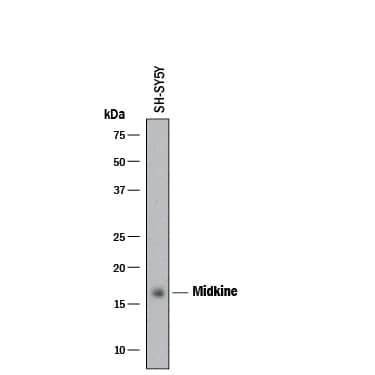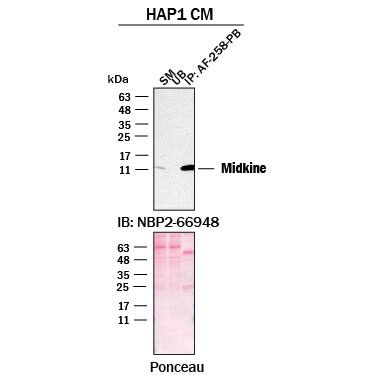Human Midkine Antibody
R&D Systems, part of Bio-Techne | Catalog # AF-258-PB


Key Product Details
Validated by
Species Reactivity
Validated:
Cited:
Applications
Validated:
Cited:
Label
Antibody Source
Product Specifications
Immunogen
Lys23-Asp143
Accession # P21741
Specificity
Clonality
Host
Isotype
Scientific Data Images for Human Midkine Antibody
Detection of Human Midkine by Western Blot.
Western blot shows lysates of SH-SY5Y human neuroblastoma cell line. PVDF membrane was probed with 2 µg/mL of Goat Anti-Human Midkine Antigen Affinity-purified Polyclonal Antibody (Catalog # AF-258-PB) followed by HRP-conjugated Anti-Goat IgG Secondary Antibody (HAF017). A specific band was detected for Midkine at approximately 17 kDa (as indicated). This experiment was conducted under reducing conditions and using Immunoblot Buffer Group 1.Midkine in Human Prostate.
Midkine was detected in immersion fixed paraffin-embedded sections of human prostate using Goat Anti-Human Midkine Antigen Affinity-purified Polyclonal Antibody (Catalog # AF-258-PB) at 10 µg/mL overnight at 4 °C. Before incubation with the primary antibody, tissue was subjected to heat-induced epitope retrieval using Antigen Retrieval Reagent-Basic (CTS013). Tissue was stained using the Anti-Goat HRP-DAB Cell & Tissue Staining Kit (brown CTS008) and counterstained with hematoxylin (blue). Specific staining was localized to stromal cell cytoplasm. View our protocol for Chromogenic IHC Staining of Paraffin-embedded Tissue Sections.Midkine in Human Ovarian Array.
Midkine was detected in immersion fixed paraffin-embedded sections of human ovarian array using Goat Anti-Human Midkine Antigen Affinity-purified Polyclonal Antibody (Catalog # AF-258-PB) at 10 µg/mL overnight at 4 °C. Tissue was stained using the Anti-Goat HRP-DAB Cell & Tissue Staining Kit (brown; CTS008) and counterstained with hematoxylin (blue). View our protocol for Chromogenic IHC Staining of Paraffin-embedded Tissue Sections.Applications for Human Midkine Antibody
Immunohistochemistry
Sample: Immersion fixed paraffin-embedded sections of human ovarian array and human prostate
Immunoprecipitation
Sample: Conditioned cell culture medium from HAP1 human near-haploid cell line
Knockout Validated
Simple Western
Sample: SH‑SY5Y human neuroblastoma cell line
Western Blot
Sample: SH‑SY5Y human neuroblastoma cell line
Reviewed Applications
Read 1 review rated 4 using AF-258-PB in the following applications:
Formulation, Preparation, and Storage
Purification
Reconstitution
Formulation
Shipping
Stability & Storage
- 12 months from date of receipt, -20 to -70 °C as supplied.
- 1 month, 2 to 8 °C under sterile conditions after reconstitution.
- 6 months, -20 to -70 °C under sterile conditions after reconstitution.
Background: Midkine
Midkine (MK) is a 15 kDa heparin-binding molecule originally cloned during a search for genes preferentially transcribed during retinoic acid (RA)-induced differentiation. Midkine belongs to a family of neurotrophic and developmentally-regulated heparin-binding molecules consisting of midkine, pleiotrophin (PTN/HBNF/OSF-1/HNGF-8) and the avian midkine homolog, RI-HB (for retinoic acid-inducible heparin-binding protein).
Midkine is a highly basic, nonglycosylated polypeptide that contains five intrachain disulfide bonds. The predicted molecular weight is approximately 13.3 kDa, based on a mature peptide length of 118 amino acid residues in the mouse and 121 amino acid residues in the human. Across species, MK shows 87% identity between the human and murine proteins. Between family members, human MK is approximately 50% identical to human PTN, with conservation of all 10 cysteines. Initial structure-function studies indicate that the C-terminal half of MK contains the principal heparin-binding site plus the molecule’s antigenicity and neurite-promoting sequences; while both the C- and N-termini are necessary for the molecule’s neurotrophic effects. Cells known to produce MK include endothelial cells, fetal astrocytes, renal proximal tubule epithelial cells and Wilms’ (kidney) tumor cells. MK has also been identified in the senile plaques of patients with Alzheimer’s disease. The pattern of expression of midkine during development strongly suggests a role for this factor both in epithelial-mesenchymal interactions and in development of the nervous system.
References
- Bohlen, P. and I. Kovesdi (1991) Prog. Growth Factor Res. 3:143.
- Muramatsu, T. (1993) Int. J. Dev. Biol. 37:183.
Alternate Names
Gene Symbol
UniProt
Additional Midkine Products
Product Documents for Human Midkine Antibody
Product Specific Notices for Human Midkine Antibody
For research use only




